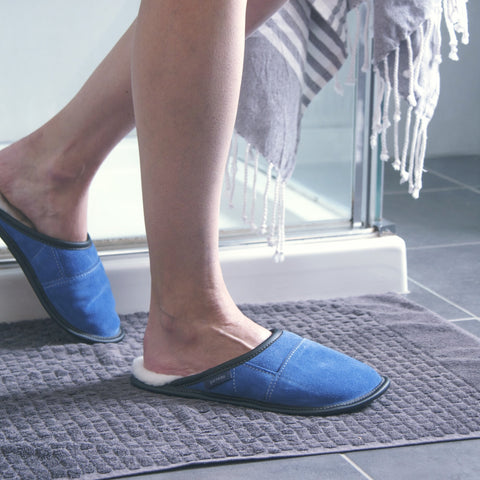
Taking care of your feet is essential to maintaining good overall health. Yet many people neglect them, exposing them to the risks of foot conditions, such as calluses, warts, fungus, ingrown toenails and more. These problems can affect your comfort, mobility and well-being. Fortunately, there are simple, effective steps you can take daily to prevent these inconveniences and maintain good podiatric health.
Choose appropriate shoes and slippers
Shoes and slippers are the main accessories that protect your feet and influence your comfort and posture. So it's essential to choose them carefully, based on the support they offer, the materials they're made from, your needs and your tastes. To help you choose the right pair of slippers, take a look at our article on how to choose the perfect slippers.
Practice good foot hygiene
Feet are parts of your body that are often exposed to dirt, sweat and infection. Maintaining good hygiene to prevent skin and nail problems, such as athlete's foot, warts, and corns, is important. When you wash your feet, don't hesitate to use a brush, pumice stone or scrub to remove dead skin and smooth out your feet.
Then, be sure to dry your feet thoroughly, especially between the toes, to prevent fungal infections like athlete's foot. These infections are caused by fungi that thrive in moist, warm, dark environments. The symptoms of fungal infections include red, itchy or cracked skin, which can be unpleasant. So take the time to dry your feet thoroughly when you get out of the shower.
Choose cotton or wool socks*, which absorb perspiration and let your feet breathe. Avoid synthetic socks, as they retain moisture and promote unpleasant odours.
Keep your nails trimmed
Trim your toenails about once a month to prevent them from becoming too long, thick and brittle. Cut straight, without rounding off the corners, to avoid ingrown toenails. Moisturize your cuticles with a special cream or oil to soften and nourish them. Push them back gently, without cutting them, to prevent infection.

Control blood circulation
Poor circulation can lead to feelings of cold, tingling, swelling, cramps, fatigue or pain in the feet. To stimulate blood circulation, simply do exercises that activate foot movement. Take up an activity you enjoy, such as walking, yoga or cycling. These activities promote venous return and prevent the formation of blood clots. Don't hesitate to lift your feet occasionally by placing them on a cushion or stool to reduce water retention and swelling.
Using a pair of sheepskin slippers* can also improve circulation. In fact, natural sheepskin is renowned for their ability to regulate foot temperature, promoting good circulation. To learn more about natural sheepskins' benefits, click here to read our article on the subject.
Use appropriate pads and insoles
To relieve pressure on your feet, use pads, especially if you're on your feet a lot.

For example, you can use foot pads, toe pads, heel pads, bunion pads, etc.
Adding a natural sheepskin insole* to your footwear can also contribute to the health of your feet. In addition to being comfortable, this type of insole provides pleasant warmth and lets your feet breathe. If necessary, use orthopedic insoles adapted to the shape of your feet. They can correct arch defects such as flat feet, gait disorders, joint pain and more!
Examine your feet regularly
It's important to check your feet regularly for redness, swelling, warts, fungus or other abnormalities. If you notice a problem, consult a healthcare professional, such as a podiatrist, dermatologist or doctor. They can prescribe a suitable treatment and advise you on how to prevent the problem from recurring.
If you suffer from diabetes, keeping an eye on your feet is even more important. Diabetes changes the sensitivity and healing process of your feet. Stay vigilant and consult a specialist regularly.
Moisturize and massage your feet
Foot skin is often dry, as it contains few sebaceous glands. You need to moisturize daily with a cream suited to your skin type. Apply the cream by massaging your feet to help the product penetrate and stimulate circulation. Foot massages are also beneficial for, among other things, relaxing muscles, relieving tension, reducing stress and improving sleep. You can use essential oils like lavender, rosemary or peppermint to enhance the effects of your massage.
You can also take a foot bath with lukewarm water and salt or herbs, such as chamomile, thyme, sage, etc. A foot bath cleans, disinfects and relaxes your feet. So why not take the opportunity to get some much-deserved R&R, too?
In sum, your feet reflect your general health and can reveal more serious problems, including diabetes, arthritis, and cardiovascular disease. By paying special attention and pampering them properly, you can prevent many common issues and keep them healthy!
*Sheepskin or cotton socks are available in men's and women's sizes.
*Sheepskin slippers are available in men's and women's sizes.
*Sheepskin soles for boots and shoes are available in men's and women's sizes.
Sources
https://www.jeancoutu.com/sante/conseils-sante/comment-bien-prendre-soin-de-vos-pieds/https://www.brunet.ca/beaute/conseils-beaute/soins-pieds-pedicure-maison/
https://www.passeportsante.net/fr/Actualites/Dossiers/DossierComplexe.aspx?doc=10-conseils-prendre-soin-pieds
https://www.noovomoi.ca/style-et-maison/beaute/article.soins-des-pieds.1.1497365.html
https://www.podiatriemarcil.com/11-conseils-pour-des-pieds-en-bonne-sante/
https://wodnews.com/prenez-soin-de-vos-pieds-en-suivant-ces-8-conseils-precieux/56665/
https://www.rvsa.fr/entrainement-trail/prendre-soin-pieds/
https://www.oolution.com/blogs/soin-de-la-peau/soin-pieds
https://trucmania.ouest-france.fr/astuces-avoir-beaux-pieds/
https://www.e-sante.fr/diabete-8-conseils-pour-prendre-soin-vos-pieds/actualite/778
https://www.rtbf.be/article/tous-les-conseils-beaute-pour-prendre-soin-de-ses-pieds-10551217
https://www.femmeactuelle.fr/beaute/news-beaute/pieds-secs-voici-la-routine-ideale-pour-en-prendre-soin-selon-une-podologue-2159381
